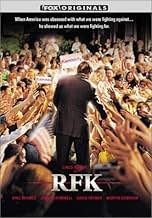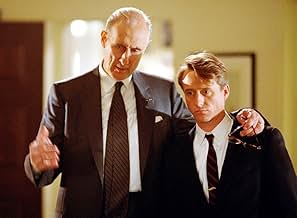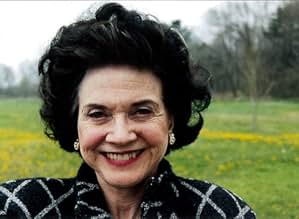Ajouter une intrigue dans votre langueFollowing the death of his brother John, Robert Kennedy is forced to rise to the challenge of leading his country and carrying on his brother's vision of what America could be.Following the death of his brother John, Robert Kennedy is forced to rise to the challenge of leading his country and carrying on his brother's vision of what America could be.Following the death of his brother John, Robert Kennedy is forced to rise to the challenge of leading his country and carrying on his brother's vision of what America could be.
- Réalisation
- Scénario
- Casting principal
- Récompenses
- 1 nomination au total
Avis à la une
As someone who grew up in the 1960s, remembers Robert F. Kennedy and admires the things he stood for, I looked forward to FX's "RFK" only to be thoroughly disappointed. While the lead actor was acceptable in his portrayal, the script itself was disappointing and shallow. It may be asking too much to expect a two-hour production (minus commercials) to do justice to the life of an extraordinary man. But if someone attempts to do precisely that, he needs to narrow his focus better. None of the major events received the in-depth attention they deserved, and some important events were overlooked entirely. Kennedy's speech to the Democratic National Convention less than a year after his brother's assassination was a poignant and extremely significant moment in his life and career, yet it received no attention in the film. With JFK's ghostly presence occupying such an important role in the film, shouldn't this event have been included -- even if it meant deleting an obviously fictitious event, like the scene in which Bobby leaps into the water to rescue his brother's jacket? Young viewers who want to learn more about this great American should not waste their time watching this film. There are better options out there!
I recall some of my college instructors speaking of being in the south during the civil rights marches to end segregation. They were very involved in the politics of the day. Of Robert F. Kennedy, I remember they told of his evolving after the death of his brother -- changing from a young, but somewhat out-of-touch, bureaucrat, to growing to be a more thoughtful, people-oriented observer -- evolving from an unquestioning hawk on international interventions, to being a leader mindful of sending young Americans to far away lands to kill and be killed.
This TV movie, RFK, did fairly well in capturing Robert Kennedy's political evolution. The lead actor playing RFK looks remarkably like the real RFK -- specially when lit by a single hard light.
Unfortunately, the final product was all too obviously a "made for TV" production. The background music was unremarkable. The editing-in of old footage to new footage was all too easy to spot. This RFK film is as bland as Oliver Stone's JFK is bold.
With such lifeless story telling, the supporting actors had little chance to bring any dimension to their roles. When real-life characters are given little depth, it is better to let unknown actors portray them.
The script is too often self-aware, too often knowing of what is coming ahead. At one point Robert Kennedy is seen giving a speech and as he speaks, he refers to himself in the past tense... "My favorite poet WAS..." not IS.
Last, the script gives us RFK: the son, and RFK: the brother, but no time is given to deeply explore RFK: the father. The number of children Robert Kennedy fathered was extraordinary. His home life must have been very interesting. I am sure there will be a new telling of the RFK story before long.
This TV movie, RFK, did fairly well in capturing Robert Kennedy's political evolution. The lead actor playing RFK looks remarkably like the real RFK -- specially when lit by a single hard light.
Unfortunately, the final product was all too obviously a "made for TV" production. The background music was unremarkable. The editing-in of old footage to new footage was all too easy to spot. This RFK film is as bland as Oliver Stone's JFK is bold.
With such lifeless story telling, the supporting actors had little chance to bring any dimension to their roles. When real-life characters are given little depth, it is better to let unknown actors portray them.
The script is too often self-aware, too often knowing of what is coming ahead. At one point Robert Kennedy is seen giving a speech and as he speaks, he refers to himself in the past tense... "My favorite poet WAS..." not IS.
Last, the script gives us RFK: the son, and RFK: the brother, but no time is given to deeply explore RFK: the father. The number of children Robert Kennedy fathered was extraordinary. His home life must have been very interesting. I am sure there will be a new telling of the RFK story before long.
In today's world the words of Bobby Kennedy could not be more prescient. This movie plays around 4 major speeches and is bookended by the death of JFK and RFK's himself. There are a few clunker moments (Martin Donovan as an uninspired JFK), but Linus Roache's portrayal of RFK is remarkable and James Cromwell's LBJ so much more of the essence than Gambon's in the HBO film, A Path To War. Roache received a Golden Globe nomination for his performance. See this movie for that alone.
The only thing this TV-movie did better than the 1985 mini-series "Robert Kennedy & His Times" was the casting of Lyndon Johnson, though neither actor was remotely like the real man in manner, speech or action.
These two docudramas cover virtually the same identical territory, though the 1985 one does it in 6 hours, and thus can go into much greater detail. I happened to watch them back-to-back (the 1985 mini-series is airing on the Starz TrueStories channel this month) and the mini-series is far better at getting into the mind of RFK--especially without ghostly pronouncements by his brother. Too bad the actor playing Johnson is so jarring, because most of the other casting is quite wonderful, especially Beatrice Straight as Rose and Veronica Cartwright as Ethel Kennedy. The blending of actual footage and newly shot footage is seamless and effective. The locations (Hickory Hill and Hyannisport) look far more like the real places than in the 2002 FX production.
The casting of RFK and JFK is always problematic and neither of these productions does terribly well. At least not for those of us who remember the real men. But for those who want to know of these events, they are adequate. It's not the actors' faults. The Kennedy brothers were so visible, memorable and distinctive that unless you're both a great actor and a virtual lookalike, no one can do it.
These two docudramas cover virtually the same identical territory, though the 1985 one does it in 6 hours, and thus can go into much greater detail. I happened to watch them back-to-back (the 1985 mini-series is airing on the Starz TrueStories channel this month) and the mini-series is far better at getting into the mind of RFK--especially without ghostly pronouncements by his brother. Too bad the actor playing Johnson is so jarring, because most of the other casting is quite wonderful, especially Beatrice Straight as Rose and Veronica Cartwright as Ethel Kennedy. The blending of actual footage and newly shot footage is seamless and effective. The locations (Hickory Hill and Hyannisport) look far more like the real places than in the 2002 FX production.
The casting of RFK and JFK is always problematic and neither of these productions does terribly well. At least not for those of us who remember the real men. But for those who want to know of these events, they are adequate. It's not the actors' faults. The Kennedy brothers were so visible, memorable and distinctive that unless you're both a great actor and a virtual lookalike, no one can do it.
An interesting character study that could've done so much more, but ends up kind of having tunnel vision. Linus Roache's portrayal of RFK as the mourning brother becoming his own man is well done, but the script doesn't do enough justice to the levels of complexities surrounding his grief and ultimately his becoming a champion of the minorities and the downtrodden. Every issue seems the same repetitive cycle. First there is a call to action by RFK's advisers -- who are generally indistinguishable and more or less interchangeable, in that there is little character development on anyone's part outside of RFK himself. Then Bobby dithers on whether he should take a stand in a "damned if I do, damned if I don't" way. At some point Jack's ghostly presence chastises him. And after another scene of Bobby interacting with the people, he suddenly decides to make the decision that had always been suggested TO him. Wash, rinse, repeat. You get the feeling that Bobby doesn't so much come off as a man of strength of forming his own convictions, but one of a wild pet that has to be trained to think like a politician. Perhaps that was the point; I'm not sure.
That being said, if that were the film's only flaw, I'd have probably been okay with it. The problem is, it seems to gloss over everything in his life that isn't his political career. As mentioned before, there is little to no character development outside of RFK himself. His wife, Ethel, comes off as glib and shallow -- and no mention is made of the fact that she was probably pregnant through half the time period the film takes place; Bobby and Ethel Kennedy had 11 children (one was born after his death), and other than a shot of two or three of them from afar once or twice, little mention is made that they are even parents. (Not to mention that he became sort of a surrogate father to JFK's kids, as well.) Shouldn't they at least be seen around the house more, or on the campaign trail with him? The film would have also done well to focus more around events and actions, and less around time spent in RFK's own headspace. One of the other reviewers mentioned the 1964 Democratic Convention, where people stood and cheered for him for over 20 minutes before he could speak -- the cheering overwhelmingly, of course, being for his brother's memory and not for RFK himself. I agree. Instead of Bobby simply saying those things after nondescript events, show it. Or the fact that RFK so soon declared his candidacy for the Presidency after Eugene McCarthy won the New Hampshire primary (they only mention beforehand that he's running); the movie makes it seem like he arbitrarily came to the decision. Showing just how much he had to catch up, the time frame we're talking about, would've added a whole new level of complexity to his character -- how sometimes historical events WERE what forced him to make a decision, but he rose to the occasion above them.
Lastly, this film also suffers because people really have to know their history to understand what's going on. This is the first film I've ever seen where the uneducated viewer has to pay attention to the opening credits to get a sense of context, since the film opens with JFK's assassination. Names and events were thrown around as though everyone knew exactly what or who they were and why they were important; if one didn't know that RFK worked for Joseph McCarthy or prosecuted the Teamsters' Union, it might be hard to pick up through their rapid-fire conversation; the film sort of throws the viewers into this universe and forces them to work backward. A flashback or two, or an extra scene or two before JFK planned to go to Dallas illustrating better the kind of man Bobby was before November 22, 1963, and the kind of bond the brothers shared would've made the rest of the film more powerful. Instead, it's all idle chatter.
It wasn't a bad film, and the concept worked; it just could've executed it better in so many ways by slightly expanding its scope and glossing over what seems important.
That being said, if that were the film's only flaw, I'd have probably been okay with it. The problem is, it seems to gloss over everything in his life that isn't his political career. As mentioned before, there is little to no character development outside of RFK himself. His wife, Ethel, comes off as glib and shallow -- and no mention is made of the fact that she was probably pregnant through half the time period the film takes place; Bobby and Ethel Kennedy had 11 children (one was born after his death), and other than a shot of two or three of them from afar once or twice, little mention is made that they are even parents. (Not to mention that he became sort of a surrogate father to JFK's kids, as well.) Shouldn't they at least be seen around the house more, or on the campaign trail with him? The film would have also done well to focus more around events and actions, and less around time spent in RFK's own headspace. One of the other reviewers mentioned the 1964 Democratic Convention, where people stood and cheered for him for over 20 minutes before he could speak -- the cheering overwhelmingly, of course, being for his brother's memory and not for RFK himself. I agree. Instead of Bobby simply saying those things after nondescript events, show it. Or the fact that RFK so soon declared his candidacy for the Presidency after Eugene McCarthy won the New Hampshire primary (they only mention beforehand that he's running); the movie makes it seem like he arbitrarily came to the decision. Showing just how much he had to catch up, the time frame we're talking about, would've added a whole new level of complexity to his character -- how sometimes historical events WERE what forced him to make a decision, but he rose to the occasion above them.
Lastly, this film also suffers because people really have to know their history to understand what's going on. This is the first film I've ever seen where the uneducated viewer has to pay attention to the opening credits to get a sense of context, since the film opens with JFK's assassination. Names and events were thrown around as though everyone knew exactly what or who they were and why they were important; if one didn't know that RFK worked for Joseph McCarthy or prosecuted the Teamsters' Union, it might be hard to pick up through their rapid-fire conversation; the film sort of throws the viewers into this universe and forces them to work backward. A flashback or two, or an extra scene or two before JFK planned to go to Dallas illustrating better the kind of man Bobby was before November 22, 1963, and the kind of bond the brothers shared would've made the rest of the film more powerful. Instead, it's all idle chatter.
It wasn't a bad film, and the concept worked; it just could've executed it better in so many ways by slightly expanding its scope and glossing over what seems important.
Le saviez-vous
- AnecdotesThis marks the second time David Paymer is involved in a film where Richard Goodwin is a major character. While in this film he plays Goodwin (RFK speech-writer) Paymer interacts with lawyer/congress investigator Goodwin in Quiz Show (1994), this time played by Rob Morrow.
- Citations
President Lyndon Baines Johnson: Even so, I gotta have you inside the tent pissin' out than outside pissin' in.
- ConnexionsFeatured in The 60th Annual Golden Globe Awards (2003)
Meilleurs choix
Connectez-vous pour évaluer et suivre la liste de favoris afin de recevoir des recommandations personnalisées
Détails
Contribuer à cette page
Suggérer une modification ou ajouter du contenu manquant






























